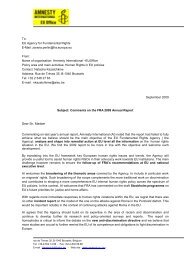Time for eULeX To prioriTize war crimes - Amnesty International ...
Time for eULeX To prioriTize war crimes - Amnesty International ...
Time for eULeX To prioriTize war crimes - Amnesty International ...
Create successful ePaper yourself
Turn your PDF publications into a flip-book with our unique Google optimized e-Paper software.
Kosovo: <strong>Time</strong> <strong>for</strong> EULEX to prioritize <strong>war</strong> <strong>crimes</strong> 45<br />
It may be assumed that Agim Zogaj committed suicide because he feared <strong>for</strong> his safety: he had allegedly<br />
received repeated threats and attempt had been made on his life. In addition, if the allegations in his letter<br />
are true, he was under extreme stress. But his death has also raised further questions about the witness<br />
protection programme.<br />
On 14 November 2011 the family of Agim Zogaj lodged a complaint against EULEX, through the Human Rights<br />
Review Panel, alleging that EULEX had failed to protect their son, a witness. 132 Following the suicide of Agim<br />
Zogaj, the OWCP in Belgrade reported receiving a telephone call from a potential witness, who had decided to<br />
withdraw his testimony following Agim Zogaj’s death.<br />
On 1 February 2012, in proceedings in the Klečka/Kleçkë case, the defence demanded that the international<br />
prosecutor in the case be suspended, as they wished to question him in relation to Agim Zogaj’s allegations<br />
that he had testified under pressure. The prosecutor claimed immunity. 133<br />
The trial of <strong>for</strong>mer Minister of Transport and ex-KLA leader Fatmir Limaj and nine others opened in November<br />
2011. They were charged with <strong>war</strong> <strong>crimes</strong>, including ordering the torture and killing of at least eight prisoners,<br />
at Klečka/Kleçkë prison camp in Drenica/Drenicë in 1999. An arrest <strong>war</strong>rant issued in March against Fatmir<br />
Limaj, a parliamentary deputy, had not been en<strong>for</strong>ced until the Constitutional Court ruled in September that<br />
deputies did not enjoy parliamentary immunity <strong>for</strong> actions outside their official responsibilities. Fatmir Limaj<br />
and nine other defendants were released from detention by a mixed panel of judges of 21 March 2012, after<br />
Agim Zogaj’s diaries were ruled inadmissible. 134<br />
<strong>Amnesty</strong> <strong>International</strong> notes that in contrast, measures to ensure that Kosovo Albanian<br />
witnesses may travel to and testify in <strong>war</strong> <strong>crimes</strong> trials in Serbia have improved since 2004,<br />
when proceedings against Serbian suspects started at the War Crimes Court. Measures are<br />
also in place <strong>for</strong> witnesses reluctant to travel to Serbia to testify by video-link. According to<br />
the Head of the WCIU, “Witnesses who have gone to Belgrade have been pleased and happy<br />
with the way that they have been treated; it is important <strong>for</strong> them to see the suspects.”<br />
Conversely, Kosovo Serbs remain too frightened to return to Kosovo and are denied access to<br />
justice. The Pristina District Court Prosecutor told <strong>Amnesty</strong> <strong>International</strong> in October 2011:<br />
“In [civil] cases in which properties were damaged [during the <strong>war</strong> or in the 2004 interethnic<br />
violence], most are now in Serbia. We have tried to invite them back to examine them<br />
as a witness or injured party, but they have not come because they are frightened, even<br />
though they may claim compensation. This is also a problem in the abduction cases, where<br />
the evidence was not properly taken”.<br />
WITNESS PROTECTION UNDER KOSOVO LAW<br />
In July 2011 the Kosovo Assembly passed a Law on Witness Protection, which established<br />
procedures <strong>for</strong> the protection of witnesses. This law empowers a Witness Protection<br />
Committee (comprising the Chief State Prosecutor, head investigator in the KP, and the<br />
director of the Witness Protection Directorate within the Kosovo Police) to decide on “the<br />
inclusion, stay and termination of the Witness Protection” – that is, who is accepted into the<br />
programme, the duration of the protection and when the period of witness protection ends.<br />
This applies to all witnesses except where a witness had requested, and been included in,<br />
EULEX’s programme. This transitional measure, remains in <strong>for</strong>ce whilst the EULEX<br />
programme remains in operation.<br />
Index: EUR 70/004/2012 <strong>Amnesty</strong> <strong>International</strong> April 2012



